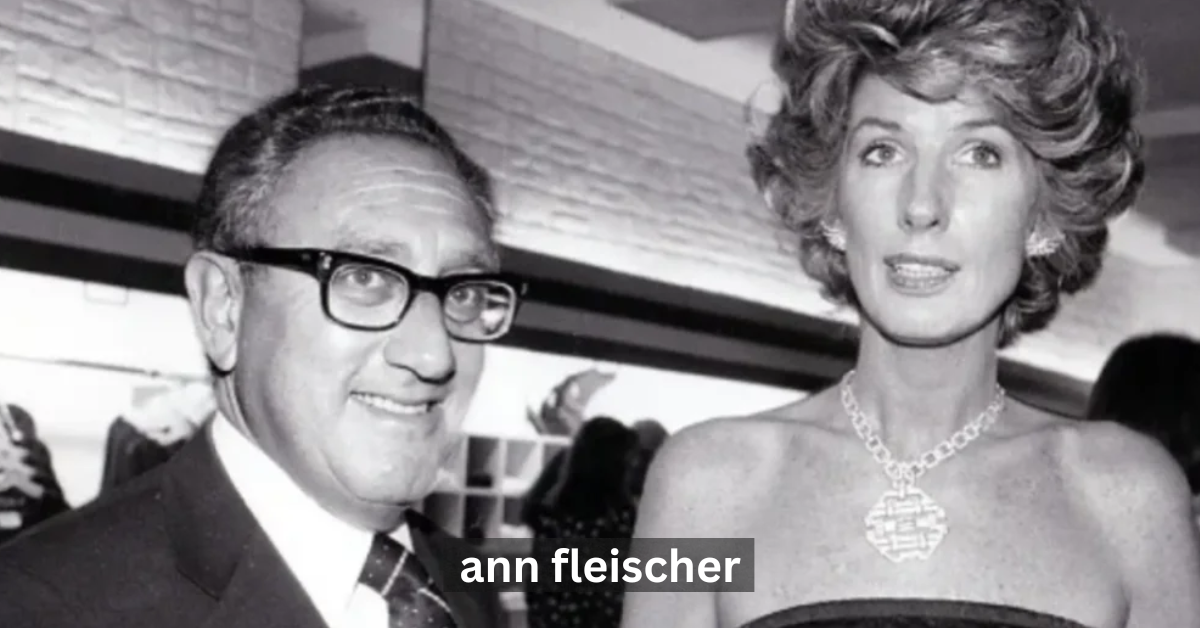Ann Fleischer was the former wife of Henry Kissinger and a notable figure in American politics, recognized for her contributions to social and philanthropic causes. This article delves into Ann Fleischer’s biography, exploring her early life, marriage, family, contributions, and the legacy she leaves behind.
Ann Fleischer, born in 1926, emerged from a background rich in cultural heritage. Her life intersected with major historical events, particularly during the Cold War era, which shaped not only her personal life but also her public influence. As the wife of Henry Kissinger, Ann Fleischer was part of a political marriage that positioned her at the intersection of diplomacy and American politics. Her legacy is profound, encapsulating the struggles and triumphs of a woman who navigated the complexities of public life while maintaining her personal values.
Her legacy is characterized by resilience and commitment. Ann Fleischer’s life story serves as a testament to the roles women play in supporting influential figures and the often-overlooked contributions they make in political and social spheres.
Profile Summary
| Full Name | Ann Fleischer |
| Date of Birth | 1926 |
| Place of Birth | New York City, United States |
| Cultural Background | Jewish, with roots in Germany |
| Education | Degree in Sociology from New York University |
| First Marriage | Married Henry Kissinger in 1949 |
| Children | Elizabeth and David Kissinger |
| Contributions | Social and political engagements, philanthropic efforts, support in Henry Kissinger’s diplomatic career |
| Philanthropic Work | Advocated for education, healthcare, and social justice initiatives |
| Key Historical Context | Lived through the Cold War era, and provided support during Henry Kissinger’s role in U.S. foreign policy |
| Second Marriage | Married Saul G. Cohen, professor of chemistry |
| Personal Interests | Passionate about arts, culture, and education |
| Legacy | She is remembered for her resilience, advocacy for women’s roles in politics, contributions to political and social circles, and philanthropic work |
| Key Influence | Played a significant role in supporting Henry Kissinger’s diplomatic career and shaping family values |
Early Life and Background
Ann Fleischer’s Childhood
Ann Fleischer was born in New York City into a Jewish family with roots in Germany. Her parents, who fled Europe in the early 20th century, instilled in her a strong sense of cultural identity and community. Growing up in a vibrant city, Ann Fleischer was exposed to diverse ideas and influences, shaping her worldview and aspirations.
Her childhood was marked by the struggles of immigrant life, providing Ann Fleischer with a unique perspective on resilience and determination. These formative experiences laid the foundation for her later pursuits, both personally and professionally.
Education and Formative Experiences
Ann Fleischer’s education played a crucial role in her development. She attended the prestigious New York University, where she pursued a degree in sociology. This academic background equipped Ann Fleischer with insights into social dynamics, which would later inform her understanding of political and public life. Her education also fostered a commitment to civic engagement and social justice, principles that guided her throughout her life.
Marriage to Henry Kissinger
Meeting and Courtship
Ann Fleischer’s life took a significant turn when she met Henry Kissinger in the early 1950s. Their courtship was characterized by mutual respect and intellectual engagement. Kissinger, a rising star in diplomatic circles, found in Ann Fleischer a partner who could match his passion for public service and his desire for meaningful dialogue. Their connection deepened as they navigated the complexities of life in the public eye.
Overview of Their Wedding
Ann and Henry Kissinger married in 1949 in a ceremony that reflected their cultural heritage and personal values. The wedding was attended by close friends and family, emphasizing the couple’s commitment to their roots and their shared aspirations. This union would not only shape their personal lives but also influence the political landscape of the United States.
Key Events During Their Marriage
Throughout their marriage, Ann Fleischer supported Henry Kissinger as he rose to prominence, becoming a key figure in U.S. foreign policy. She was often seen accompanying him to events, where her poise and intelligence garnered admiration. Notably, during the Cold War, Ann Fleischer’s presence added a layer of personal warmth to the often austere world of diplomacy.
Family Life
Children: Elizabeth and David Kissinger
Ann Fleischer and Henry Kissinger welcomed two children into their family: Elizabeth and David. As a mother, Ann Fleischer was devoted to her children’s upbringing, instilling in them the values of education, integrity, and social responsibility. Elizabeth, a notable figure in her own right, has often spoken about the influence her mother had on her life and career.
Parenting Philosophy and Family Dynamics
Fleischer’s parenting philosophy was rooted in nurturing independence and critical thinking. She encouraged her children to explore their interests, fostering a home environment where dialogue and debate were welcomed. This approach not only strengthened their family dynamics but also prepared Elizabeth and David for their respective paths in life.
Balancing Public Life and Family Responsibilities
Ann Fleischer navigated the challenges of balancing her public life with family responsibilities with grace. While her marriage to Henry Kissinger thrust her into the limelight, Ann Fleischer remained committed to her family. She understood the importance of maintaining a supportive home environment while being an active participant in social and political circles.
You May Also Like: Who is Chassidy Celeste Blackstock? All You Need To Know
Ann Fleischer’s Contributions
Role in Political and Social Circles
Ann Fleischer was more than just Henry Kissinger’s wife; she was an active participant in political and social circles. Her insights and perspectives were valued among influential figures, and she used her platform to advocate for various causes. Her involvement in charitable organizations showcased her commitment to social justice and the betterment of society.
Influence on Henry Kissinger’s Career
As a confidante and advisor, Ann Fleischer played a crucial role in shaping Henry Kissinger’s views and decisions. Their discussions often revolved around pressing issues of the day, and Ann Fleischer’s intelligence and understanding of social dynamics provided valuable context for Kissinger’s diplomatic endeavors. Her influence was particularly felt during critical moments of U.S. foreign policy during the Cold War.
Involvement in Philanthropic Efforts
Ann Fleischer’s commitment to philanthropy further solidified her legacy. She was involved in various initiatives aimed at improving education and healthcare, reflecting her belief in the power of social change. Her philanthropic efforts demonstrate the profound impact she had on her community and beyond, showcasing the multifaceted contributions of Ann Fleischer.
Cultural and Historical Context
Life During the Cold War
Ann Fleischer’s life was deeply intertwined with the historical context of the Cold War. This period of tension and political upheaval influenced her marriage and public engagements. As Henry Kissinger navigated the complexities of U.S. foreign policy, Ann Fleischer provided support, embodying the resilience and adaptability characteristic of women during this tumultuous time.
Ann Fleischer’s Position in American Politics
Within the realm of American politics, Ann Fleischer’s position was one of quiet strength. While she often operated in the background, her contributions were significant. The dynamics of political marriages during this era often placed women like Ann Fleischer in roles that, while less visible, were essential to the success of their partners.
The Impact of Historical Events on Her Life
Historical events during the Cold War had a profound impact on Ann Fleischer’s life. The political landscape was changing rapidly, and her ability to adapt and respond to these changes reflects her intelligence and resilience. Ann Fleischer’s life serves as a lens through which we can understand the broader societal shifts that occurred during this period.
Second Marriage and Later Years
Relationship with Saul G. Cohen
After her marriage to Henry Kissinger ended, Ann Fleischer found love again with Saul G. Cohen, a professor of chemistry. Their relationship was characterized by mutual respect and shared intellectual pursuits. Ann Fleischer and Cohen enjoyed a fulfilling partnership, allowing her to explore personal interests and academic endeavors outside the realm of politics.
Reflections on Life After Henry Kissinger
In her later years, Ann Fleischer reflected on her experiences with Henry Kissinger, often emphasizing the lessons learned and the challenges faced during their marriage. Her reflections serve as a powerful reminder of the complexities of public life and the personal sacrifices often made by those in the spotlight.
Personal Pursuits and Interests
Ann Fleischer was not just defined by her relationships; she was an individual with diverse interests and pursuits. She engaged in various cultural and artistic endeavors, showcasing her multifaceted personality. Her passion for the arts and education highlighted her belief in the importance of personal growth and lifelong learning.
Public Perception and Legacy
How Ann Fleischer is Remembered Today
Today, Ann Fleischer is remembered not only for her marriage to Henry Kissinger but also for her contributions to political and social discussions. She has become a symbol of the often-unseen roles women play in shaping history, inspiring future generations to engage in public life and advocacy.
Contributions to Discussions About Women in Politics
Ann Fleischer’s experiences have sparked important conversations about the roles of women in politics. Her legacy encourages a reevaluation of how women’s contributions are recognized and valued within political spheres, highlighting the need for greater representation and acknowledgment of female voices.
Legacy in American History
In the grand tapestry of American history, Ann Fleischer’s life is woven with threads of resilience, influence, and dedication. Her contributions have left an indelible mark, serving as a reminder of the power of personal commitment to public life and the importance of nurturing future generations of leaders.
Frequently Asked Questions
What was Ann Fleischer’s role in Henry Kissinger’s career?
Ann Fleischer provided support and insight, influencing Kissinger’s views and decisions during his tenure as a prominent diplomat.
What is Ann Fleischer’s legacy?
Ann Fleischer is remembered for her resilience, contributions to public life, and advocacy for social causes, inspiring future generations.
How did Ann Fleischer influence her children?
Ann Fleischer emphasized education and independence in her parenting, shaping her children’s values and encouraging them to pursue their passions.
What can we learn from Ann Fleischer’s life?
Ann Fleischer’s life teaches us about the importance of resilience, the often-overlooked roles of women in politics, and the impact of personal commitment to public service.
Conclusion
In summary, Ann Fleischer’s life is a rich narrative of influence, resilience, and dedication. From her early experiences to her marriage with Henry Kissinger and beyond, Ann Fleischer exemplified the strength and grace of women navigating complex social and political landscapes. Her legacy continues to inspire, reminding us of the significant impact individuals can have in shaping history and advocating for social change.
Stay in touch to get more updates & alerts on Picnob! Thank you



